It can sometimes be hard to know the best way to respond to what’s happening in our world. Often times, we read stories or see reports on TV or on social media that put us at a loss for words. And sometimes, it’s not possible to stay silent. Many adults may be fielding questions from their children and teens about today’s turbulent events–especially regarding the tragic death of George Floyd and the turmoil that it has sparked.
We here at Plugged In are committed to providing resources for parents, which is why we’ve put together a list of films that address the topic of racism in age-appropriate ways. Some may be appropriate for your whole family, while others might be more suitable for teens. Regardless, these movies tackle issues of race and discrimination powerfully and poignantly and, often, differently. They give lessons on the history of racial discrimination and also show the ways that people have responded it. And while they may not answer every question, we hope that you can use these films to open the conversation about race in a healthy and positive way.
Just Mercy (PG-13, Available on Amazon Prime and YouTube)
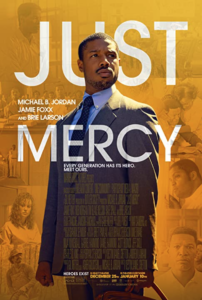 Walter McMillian, better known as Johnny D, is on death row. The black man was convicted of killing a white woman named Ronda Morrison: Prosecutors said that he walked into a laundromat on Nov. 1, 1986, and shot her several times in the back. In a trial that took just a day and a half, he was tried and convicted by an almost all-white jury, which recommended life in prison. Not harsh enough, the judge decided, and slapped Johnny D with the death penalty.
Walter McMillian, better known as Johnny D, is on death row. The black man was convicted of killing a white woman named Ronda Morrison: Prosecutors said that he walked into a laundromat on Nov. 1, 1986, and shot her several times in the back. In a trial that took just a day and a half, he was tried and convicted by an almost all-white jury, which recommended life in prison. Not harsh enough, the judge decided, and slapped Johnny D with the death penalty.
Never mind that the crime’s main witness was a convicted felon himself who had plenty of reason to frame McMillian. Never mind the lack of motive or physical evidence. Never mind that a score of witnesses said he was at a fish fry when the crime took place. (The fact that those witnesses were black, apparently, made their testimony unwanted.)
Enter Bryan Stevenson, a graduate of Harvard Law School who rejected a position at a posh law firm to head a non-profit legal team called the Equal Justice Initiative—an organization that gives convicted felons (particularly those on death row) the sort of legal help that might’ve escaped them the first time around. He looks into McMillian’s case and finds all sorts of inconsistencies—so many, in fact, that he wonders whether anyone read the evidence at all. If anyone deserves a second chance at justice, it’s McMillian.
Just Mercy is a beautiful example of the work, the courage and the faith it takes to push against the wrongs of this world: faith that a broken system can still be repaired enough to yield a semblance of justice. Faith that good people can stand up for a good reason. Faith in God, too, whose presence we subtly feel throughout the film.
The movie—which pretty much anyone with an Internet connection can watch for free right now on Amazon Prime, YouTube and the movie’s own streaming site—is not without some issues (mostly language), but its redemptive payoff make it well worth considering.
Remember the Titans (PG, Available on Disney+)
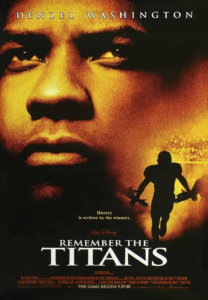 When the tension of forced integration invades a high school football program in 1971 Virginia, players and coaches must rise above racial prejudice, win ball games and ensure that everyone will Remember the Titans. Based on a true story, this film features the Oscar-winning Denzel Washington as coach Herman Boone, a taskmaster sent to lily-white T.C. Williams High to take over the football team there—supplanting successful local favorite Bill Yoast. Battling their own pride and bigotry, the men develop a bond. They also shape the character of young athletes and unite a divided community.
When the tension of forced integration invades a high school football program in 1971 Virginia, players and coaches must rise above racial prejudice, win ball games and ensure that everyone will Remember the Titans. Based on a true story, this film features the Oscar-winning Denzel Washington as coach Herman Boone, a taskmaster sent to lily-white T.C. Williams High to take over the football team there—supplanting successful local favorite Bill Yoast. Battling their own pride and bigotry, the men develop a bond. They also shape the character of young athletes and unite a divided community.
Motivational speeches and virtuous behavior project an old-fashioned respect for discipline, integrity and Christian faith. Specifically, a coach stands up to corruption and makes a supreme personal sacrifice. But most impressive of all is how Titans captures the passion of its subject matter without resorting to deeply offensive slurs or locker-room vulgarity. (That said, parents should be aware of one odd scene where a teammate provokes another by kissing him on the lips a locker room.)
Hidden Figures (PG, Available on Hulu)
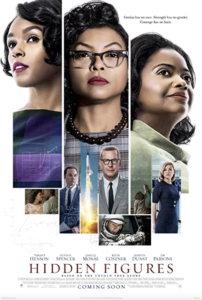 Dorothy Vaughan, Mary Jackson and Katherine Goble work at Langley Air Force Base’s West Campus, where the “colored people” are kept. They and others do important work: They’re the computers before the computer age, women who calculate and crunch the numbers that are so critical to the space program’s future. But these computers are kept apart from the rest. They have their own bathrooms, their own cafeterias, their own coffee machines. In 1961, integration was not, it would seem, part of NASA’s future any more than it was Virginia’s.
Dorothy Vaughan, Mary Jackson and Katherine Goble work at Langley Air Force Base’s West Campus, where the “colored people” are kept. They and others do important work: They’re the computers before the computer age, women who calculate and crunch the numbers that are so critical to the space program’s future. But these computers are kept apart from the rest. They have their own bathrooms, their own cafeterias, their own coffee machines. In 1961, integration was not, it would seem, part of NASA’s future any more than it was Virginia’s.
Sometimes, however, talent and determination have a way of making their own futures. America’s fledgling space program—which is locked in a battle with the U.S.S.R. that it’s surely losing—can use all the brilliant minds it can find. And some of those minds might just be working out of the West Campus, using the bathrooms labeled “Colored Women Only.”
Hidden Figures is an inspirational exercise in understated activism. The women here do not ignore the racism that colors their lives. But they resist it not with violence or protest but with skill and persistence. Yes, they ask for the rights that are rightfully theirs. But they do so with a sense of grace, humility and patience. They don’t trust the system. But they find a way to work within it to achieve their goals. And they change a lot of minds along the way.
Hidden Figures inspires as it entertains. It acknowledges racial divisions while insisting that there’s more than one way to fix them. And while it can be crass, its heart is good.
Black Panther (PG-13, Available on Hulu and Disney+)
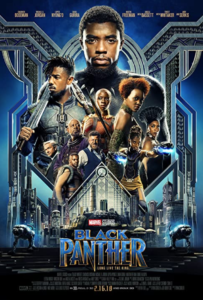 This Marvel movie was the first blockbuster superhero movie not only to star a black hero, but a predominantly black cast as well (including Oscar winners Lupita Nyong’o and Forest Whitaker and newly minted Emmy winner Sterling K. Brown). Oscar-winner Octavia Spencer, who’s not even in the movie, thought the movie was important enough to rent out an entire movie theater and fill it with “an underserved community … to ensure that all our brown children can see themselves as a superhero.” Black Panther, in its own superhero-y way, deals with bigger cultural touchstones, most notably racial upheaval.
This Marvel movie was the first blockbuster superhero movie not only to star a black hero, but a predominantly black cast as well (including Oscar winners Lupita Nyong’o and Forest Whitaker and newly minted Emmy winner Sterling K. Brown). Oscar-winner Octavia Spencer, who’s not even in the movie, thought the movie was important enough to rent out an entire movie theater and fill it with “an underserved community … to ensure that all our brown children can see themselves as a superhero.” Black Panther, in its own superhero-y way, deals with bigger cultural touchstones, most notably racial upheaval.
But while this movie certainly has a special appeal for one segment of superhero lovers, it’s also a movie made for all of us. Black Panther preaches—and I think that’s a fair characterization—that we have a responsibility to make the world a better place. To help folks when and where we can. To use the gifts that God has given us to serve others and to hold ourselves to high, honorable standards. It tells us that while we can fight back against evil, we cannot respond to hate in kind. The only thing that can overcome man’s worst impulses is to aspire to be better. More honorable. More just.
Black Panther, like most superhero movies, is an aspirational story—one that encourages all of us to up our game, superpowers or no. It’s a hard road such stories ask of us, no question, and the movie even acknowledges as such. When T’Challa faces his dearly departed father, he’s told flat out, “You are a good man with a good heart. And it is hard for a good man to be king.” But T’Challa’s determined to try to be both, whatever the cost.
Black Panther has its share of problems—whether it’s the film’s occasionally intense violence, it’s occasional profanity or its often hinky spirituality. Still, it has a good heart, and it gives us a real hero—strong and honorable and, when possible, even filled with grace.
Selma (PG-13, Available to stream for free on most digital platforms)
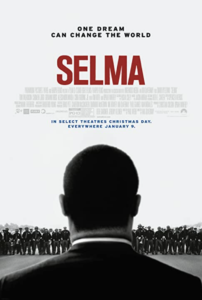 Dallas County, Ala., is 57% black in 1965, but less than 1% are registered to vote. Only 130 souls, the rest barred from the voting booth by ridiculous tests and deeply ingrained institutional racism. It’s been nearly a century since the Civil War, and it looks like it hasn’t changed a thing.
Dallas County, Ala., is 57% black in 1965, but less than 1% are registered to vote. Only 130 souls, the rest barred from the voting booth by ridiculous tests and deeply ingrained institutional racism. It’s been nearly a century since the Civil War, and it looks like it hasn’t changed a thing.
But there’s hope in the wind. The Rev. Martin Luther King Jr.—civil rights leader and newly minted winner of the Nobel Peace Prize—is coming to town with his organization, the Southern Christian Leadership Conference. If anyone can help shake off the shackles of voter discrimination in Selma, many say, King can.
King understood righteous anger and how it could lead to violence. “In the final analysis, a riot is the language of the unheard,” he once said in a speech. And yet King was committed to non-violence. When it came to his Movement, he stressed how important it was to take the moral high ground: Protestors should not fight back, no matter how much they might be roughed up and abused.
That dovelike posture also was incredibly shrewd, though. As Selma tells us, King’s “passive” posture wasn’t just about taking the high road. It was about showing the world you’re taking it. King’s strategy was dependent on drawing attention—and television cameras—to places like Selma, and letting everyone see the barbarism being doled out to the protesters. King wanted the protests to be “in the newspapers every morning, on TV every night.” No one wanted innocent people to get hurt, least of all King. But he knew that if protesters were seen on national television being lambasted and abused, outrage would follow, which in turn would be followed by change.
Selma is more than just a cinematic civics lesson, though. And it’s not merely the sum of its theatrical parts. (Parents should be aware that the film includes violence, foul language, sexual sins and, of course, disturbing acts of racism). This powerful movie manages to soar in a way that few do, reminding us all of how a determined movement led by a passionate preacher helped make progress toward a more free, more just society. And today, perhaps it reminds us that more progress must yet be made.



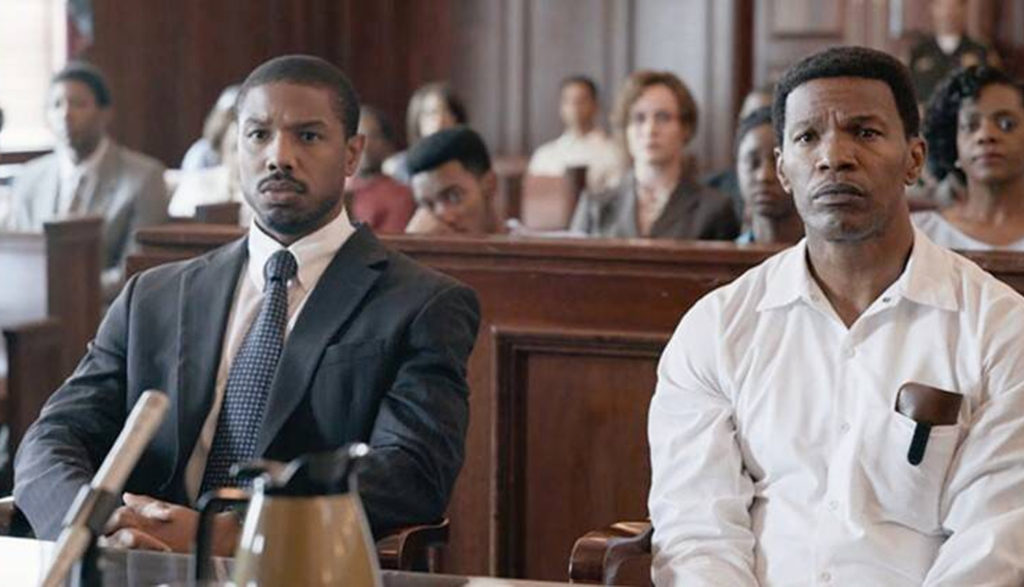



Recent Comments